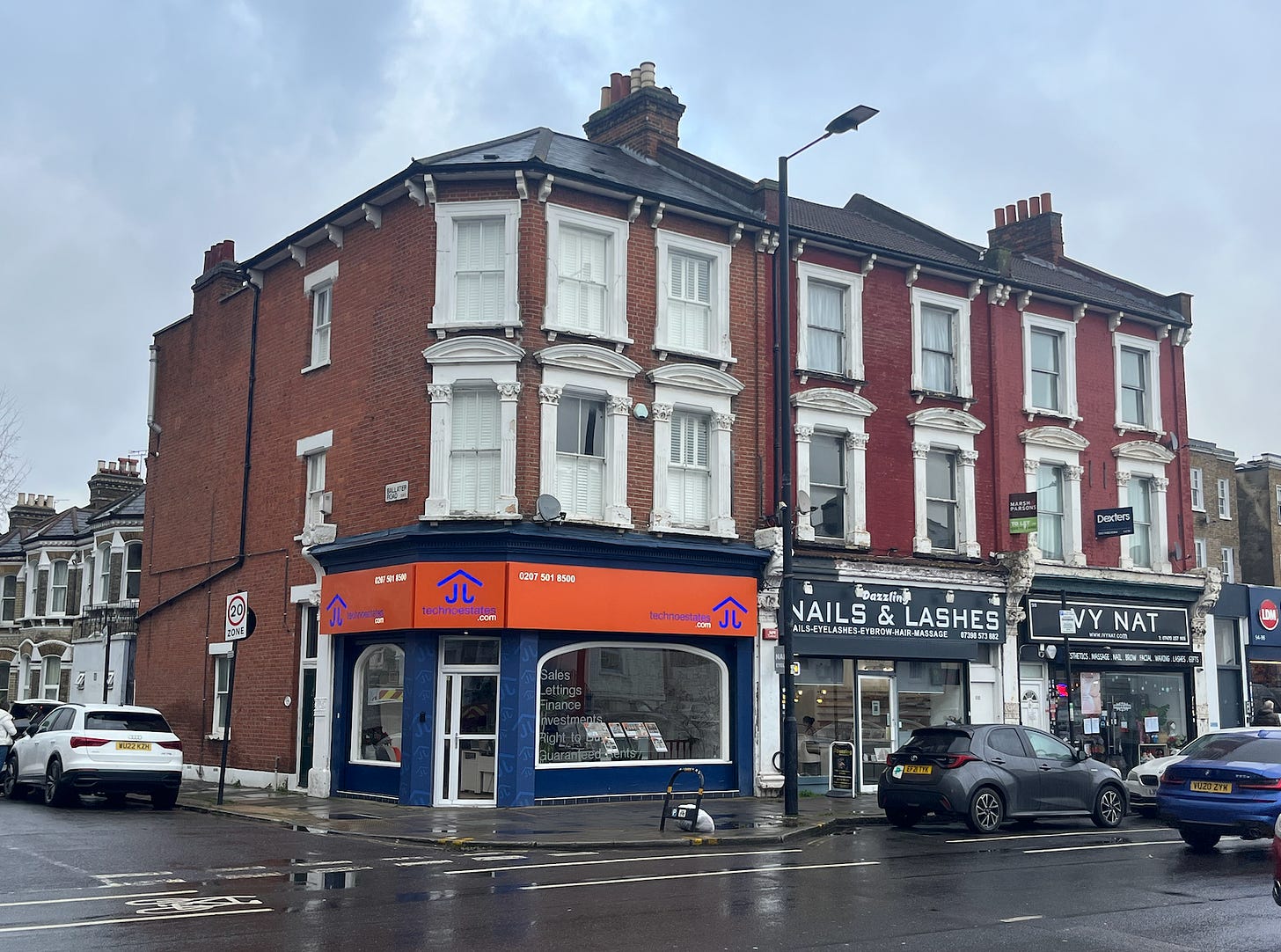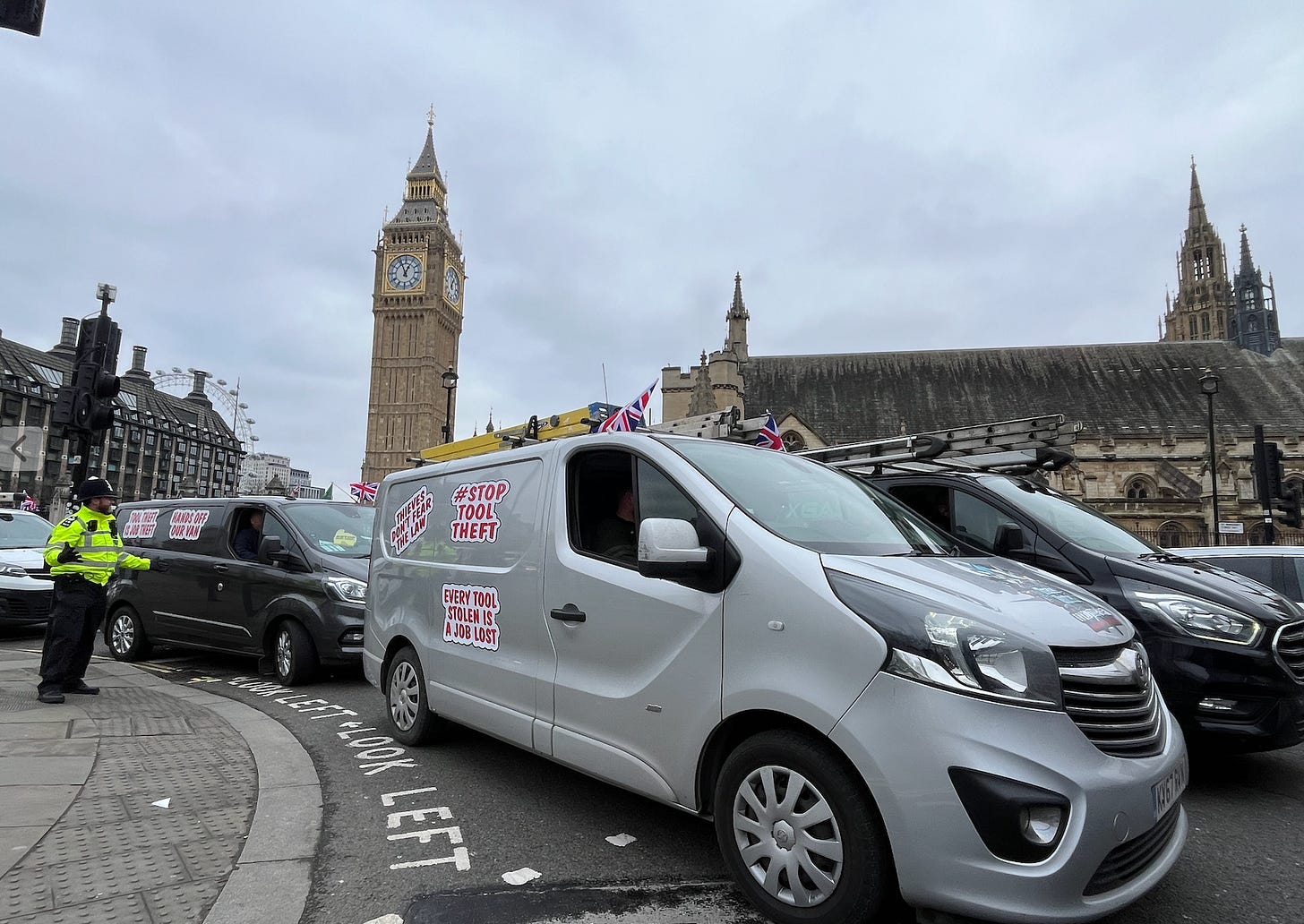Will Sadiq Khan's new nightclub plan actually achieve anything?
Plus: Co-working space for the tech elite owes a million pounds to local councils and a cyberattack at a London university.
Welcome to London Centric, where we’re fast becoming experts on the powerful individuals and ownership structures that sit behind our city. We received a huge amount of readers’ emails and comments about our piece on Asif Aziz, the billionaire who owns half the West End and is behind the possible closure of the Prince Charles Cinema. There will be more coming on him – and others like him – soon.
But for today’s edition, to lean into the theme, the beat goes on. Today I’ve asked Ed Gillett, author of the book Party Lines: Dance Music and the Making of Modern Britain, to cut through the noise and analyse the launch of Sadiq Khan’s new “Nightlife Taskforce”.
He talked to the mayor and asked whether this will be more successful than the work of former “Night Czar” Amy Lamé — or just a fig leaf to spare Sadiq Khan’s blushes over the decline of the capital’s venues.
Scroll to the end to read that piece.
Original journalism about the capital costs money. If you’re able to support London Centric, please do consider signing-up as a paying member.
You can join for 25% off here — meaning a year’s subscription is just £59 — or test the waters before you buy with a free trial.
Exclusive: London councils on hook for million pounds after collapse of private members’ club for capital’s tech elite.
Second Home, the chain of co-working spaces and private members’ clubs founded by David Cameron’s former tech adviser Rohan Silva, went bust in December. It ran up enormous losses while trying to convince London’s tech community to work from its expensively-designed offices.
Now, documents relating to its administration seen by London Centric show Second Home owed more than a million pounds to various London boroughs — adding to the financial crises at those councils.
Second Home, which operates luxurious WeWork-style shared office spaces across inner London, was hit particularly hard by the pandemic and the shift to work from home but had always struggled with its finances. Silva finally quit the business last year and it was sold in a pre-pack administration last month.
The documents show Hackney council was owed £829,000 by the company, Tower Hamlets £150,000, Islington £53,000, and Kensington and Chelsea £40,000. The exact nature of the debt is not specified, but it is believed to relate to unpaid business rates — the equivalent of council tax which is charged on commercial properties such as offices. The councils don’t expect to receive a penny of these debts from Second Home, which will continue to operate under new ownership.
Exclusive: Birkbeck hit by cyberattack.
Birkbeck, part of the University of London, was hit by a previously-unreported cyberattack last year — joining a list of the capital’s institutions including Transport for London, the Guardian, and the British Library that have been targeted by similar attacks. Sources told London Centric that despite months of disruption there has never been a formal message to staff or students about the incident, any explanation of why certain key systems were offline, whether any student data was affected, or who was responsible.
A spokesperson confirmed to London Centric they had referred themselves to the Information Commissioner’s Office: “Birkbeck discovered malicious activity on its IT systems last summer and with the help of external experts, took immediate action to contain the incident, which included taking its systems offline. All relevant authorities were notified about the incident at the time.”
Does this look like the headquarters of a company worth £58 billion?
London-based Avis Capital Ltd is either the UK’s 13th wealthiest company or an enormous financial fraud. According to recent report by Tax Policy Associates which branded the business the “£58bn company that doesn’t exist”, this deeply dubious business claims to sell extremely profitable financial investments. Yet, according to legal documents, it is headquartered in a branch of an estate agency on a down-at-heel section of Acre Lane in Brixton.
When London Centric visited the estate agents last week, the office manager insisted his business was unfortunate collateral in a scam. He said he had never met any of the company directors who were supposedly running one of the UK’s biggest companies from his office branch.
Although the estate agents had received post addressed to Avis Capital Ltd for some years, his team had marked it ‘return to sender’ and put it back in the post box unopened — a policy they take with all correspondence not intended for their business. He also bemoaned the relevant authorities for leaving his business in this awkward position by not checking the registration details of a company that supposedly has £58 billion of assets. Although it is illegal to file false financial information in the UK there is limited verification as to whether a company is actually telling the truth — another reason London is a global centre of fraud.
Tool stationary.
Parliament Square was brought to a standstill on Monday lunchtime, with dozens of white vans blocking the road and refusing to move in protest at the police’s lack of action on tool theft, which they say is putting them out of work. Many of the tradespeople singled out the Metropolitan Police for criticism and suggested tool theft is now de facto legalised in the capital due to lack of enforcement, alongside bicycle theft and mobile phone theft.
Roofer Greg Grimshaw, blocking the road by the Elizabeth tower, told London Centric he had spent £18,000 replacing stolen power tools and other goods in the last five years. He said the costs of these thefts are passed on to ordinary Londoners through increased maintenance costs on their properties: “We’ve got lots of tourists who come here to look at beautiful buildings like this, they wouldn’t be here without tradesmen like us.”
Grimshaw said his company had seven vehicles emptied of tools in the middle of the day while working on a job in Hampstead, north London. He blamed organised crime gangs who can clear out a van in a matter of minutes and rapidly resell the high-value goods, either at home or overseas: “They drill the sides and pull the doors off vans. I spent £1,200 to secure the side of a transit van with bolts and deadlocks and they still got in.”
The protest attracted a hefty police presence. London Centric overheard one Met officer, standing next to a protestor dressed as a giant spanner, explaining to a foreign tourist that the protest was about “whether enough is being done to catch thieves”.
Sadiq Khan has a new plan for London’s nightclubs: Will it produce more than hot air?
by Ed Gillett, author of Party Lines: Dance Music and the Making of Modern Britain.
Finding yourself on the dancefloor at Fabric at 9am would normally suggest a fairly specific state of mind. On Monday morning, watching Sadiq Khan sway with the bass in a demonstration of the club’s state-of-the-art soundsystem, things felt decidedly tamer. Even so, this might end up being one of the most influential parties the club has ever thrown.
London Centric was in the club by Smithfield market for the launch of the mayor’s new Nightlife Taskforce: a 12-strong group of late night venue owners, promoters and other industry insiders, chaired by Fabric boss Cameron Leslie. They’ve been asked by the mayor to spend the next six months investigating the capital’s night-time economy and making a series of recommendations in the face of venue closures, rapid increases in operating costs, and an ongoing debate about the health of London’s nightclubs.
Khan, taking time away from the soundtrack of generic techno, framed the issue as one of cultural and economic revival. While his team accept industry figures showing capital has lost 19% of its late night venues since the pandemic, they insist this decline is smaller than in Manchester and Birmingham. Khan told London Centric: “I’m determined to do all I can to work alongside our nighttime industries.”
Yet for all the positive talk, it’s hard to escape how his new organisation was born out of Amy Lamé’s resignation in October as London’s first — and potentially last — Night Czar.

The Night Czar job, based on a similar position in Amsterdam, was seen as an easy win for Khan when he created the position in 2016, shortly after becoming mayor. Lamé, a club promoter and would-be Labour politician, took the job and talked of turning the capital into a 24-hour city. She scored an early high-profile success by helping with the reopening of Fabric, which had been closed for five months following drug-related deaths and an undercover police operation. Yet Lamé’s inability to halt the persistent decline of inner London’s nightlife and ever-tighter licensing restrictions on many late-night venues saw her face a consistent stream of criticism throughout her eight-year tenure.
“Everything that happens in the city between 6pm and 6am.”
Some of this criticism, including frustrations over the Night Czar’s limited scope and lack of statutory powers, was arguably justified. Lamé’s lacklustre response to Hackney Council’s aggressive clampdown on nightlife in 2018 was perceived by many in the dance music community as an early mis-step and the point at which many promoters and DJs began losing faith in her. But other public griping missed the mark, failing to acknowledge Lame’s steady coalition-building behind the scenes, or treating her as a scapegoat for issues that neither she nor the mayor’s office had any power to influence.
Her critics also ignored the reality that many key decisions about which venues are allowed to remain open late remain the preserve of London’s 33 local authorities, with the mayor’s office having little authority other than to try and cajole local councils into changing policy.
There’s also the wider issue of whether today’s Londoners can either afford, or want, to stay out until the early hours.
Research from club operators Rekom suggests that the cost of living crisis is squeezing demand: people are going out less often, and spending less money when they do so. Compared to the generations who went clubbing in the 1990s, for example, people in their 20s today tend to be a lot less into going out late. Meanwhile venue owners are being hammered by rapid cost increases for everything from energy bills to staff wages. A city with a reputation for nightlife that has endured since before London’s Swinging Sixties era is rapidly losing spaces dedicated to the late night economy.
One of Lame’s problems was that she had a job title which covered too broad a remit. One City Hall definition of the night involved “everything that happens in the city between 6pm and 6am”, an incredibly broad remit that covered restaurants, transport and office cleaners as much as clubbers.
“I don’t want to stake my personal reputation on being some kind of political pawn.”
This time around Khan’s approach to the capital’s nightlife is different, less ambitious, and more targeted. Perversely, this might mean that more could be achieved.
Keep reading with a 7-day free trial
Subscribe to London Centric to keep reading this post and get 7 days of free access to the full post archives.







